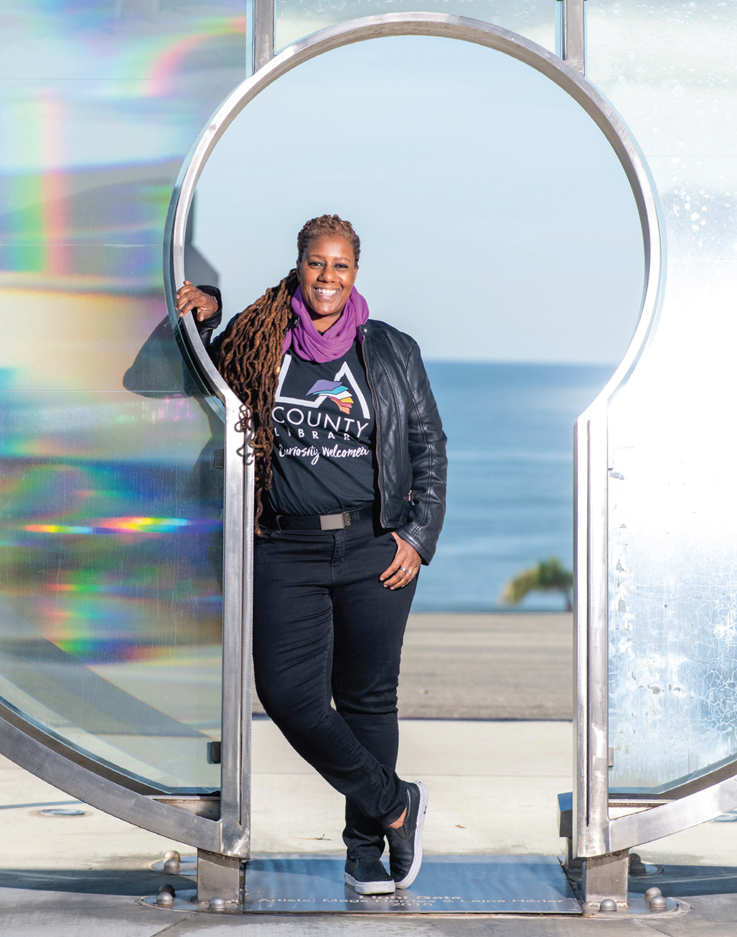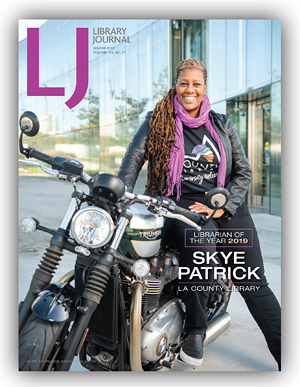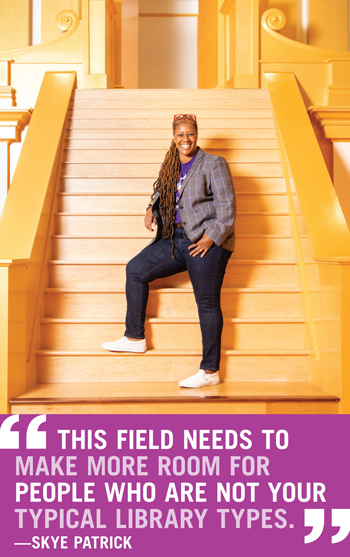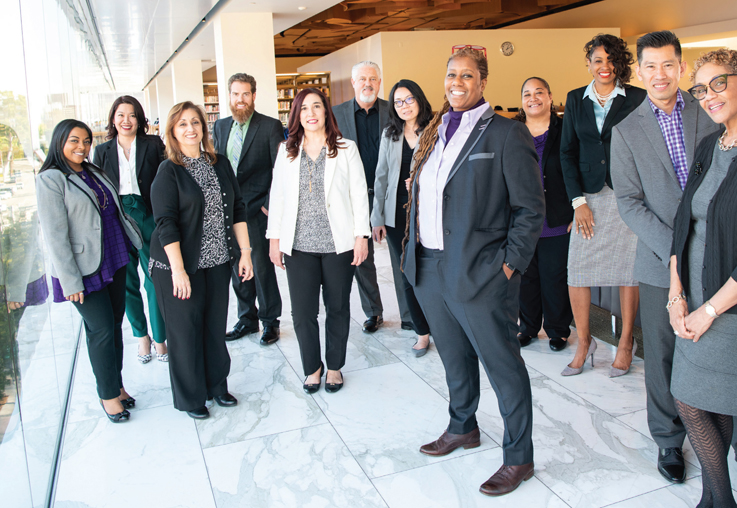Skye Patrick, LJ Librarian of the Year
LJ’s 2019 Librarian of the Year directs the LA County Library with creativity and an inclusive spirit
“There is a strong, important future for libraries.... Libraries are not about books, they are about people. We have to change how we serve and engage people,” says Skye Patrick, director of the LA County Library since February 2016. “The library of the 21st century must build a high level of engagement with the community and all the people and be a constant learning environment both formally and informally.”
To effect that change, says Patrick, requires change within as well as without. “This field needs to make more room for people who are not your typical library types. We need to make room for different disciplines to come into this field and expand it.”
LA County hosts one of the largest library systems in the United States, with 87 library facilities serving 3.4 million people.

SKYE-LIGHTLight Gate by Mags Harries and Lajos Héder, in front of the Manhattan Beach branch, provides vistas to the Pacific Ocean. Photo by David Zentz
“I remember thinking, ‘Am I absolutely mad?’ when I applied for this job,” Patrick says. Nonetheless, she didn’t hesitate to tackle the big challenges from day one. From the beginning, she recognized the unique, varied populations LA County serves and pushed internal and external efforts to ensure that its programs are designed to address equally all the needs of all the diverse residents of the county. Los Angeles County is one of the most diverse in the nation: the population is about 48 percent Latinx, 28 percent non-Latinx white, 14 percent Asian, nine percent African American, 22 percent other races, and five percent from two or more races. (Percentages do not add up to 100 because some respondents identify in more than one category.)
Patrick’s efforts to eliminate barriers and increase access to services for her residents have had a huge impact. Her transformative work at the library, as well as in her previous position as director of Florida’s Broward County Library, and her strategic approach to revolutionizing what we mean by inclusion in libraries earned her recognition as LJ’s 2019 Librarian of the Year, generously supported by Baker & Taylor.
LA iCOUNTY
Patrick introduced the iCount training initiative to LA County staff to ensure that staff members consciously design services and programs in each branch that address the needs of the diverse communities they serve.
In iCount, equity means more than universal access. It creates deliberate, intentional efforts to ensure that all community members get the resources they need, knowing those needs differ as a result of race, ethnicity, age, religion, sexual orientation, gender, socioeconomic status, physical ability, nationality, legal status, and more.
The training developed at LA County is designed to help supervisors and managers educate staff and explore issues of equity, develop and implement equity plans, and create opportunities for continued equity discussion. The program began in June 2017, and by June 2018, every LA County branch had created a LEAP (library equity action plan). The plans have now been implemented and final reports submitted. Still, the process is not over. According to Patrick, “Each library is now required once or twice a year to write a new LEAP, an internal action plan. There is no plan for the entire system. Each library’s plan is focused on its users. To manage all this we designed an Office of Education and Programs.”
 In the past two years, the entire senior staff of LA County have completed iCount.
In the past two years, the entire senior staff of LA County have completed iCount.
“There is a long way to go to being culturally competent, but at least we have opened the door. This first year we focused on young men of color as part of the Obama administration’s ‘My Brother’s Keeper’ program and on LGBTQ youth. The second year we focused on older adults and differently abled and differently bodied people,” reports Patrick.
“Of course, we had some resistance. People don’t want change. We have done a considerable amount of changing in the past three years,” says Patrick.
“By convincing staff that it was the way to be a better librarian to their community we were able to get around some of the unease. Not everyone bought in, but a significant portion of LA County staff did. The second way we overcame unease was to have the staff focus on the local community that mattered most for their library. In West Hollywood, they had success providing services for the homeless and services for the LGBTQ population. Other libraries served considerable [English as a Second Language] people, and we offered citizenship and immigration classes. We provided a speaker series for older adults and story times for younger children identified as on the spectrum. Libraries needed to [concentrate] on their local communities because the county is so diverse in myriad ways.”
BACK IN THE BLACK
As part of her huge remit, Patrick is responsible for an annual operating budget of $165 million. When Patrick arrived, the library was facing a deficit. Yet in the short two and a half years of her management, she has raised more than $30 million in grants, expanded mobile programming, and adjusted staffing to expand service hours across 75 of the system’s locations at no additional cost to taxpayers, largely through administrative reorganization. She has built partnerships with public and private organizations to provide more services with little impact on the budget. Patrick tells LJ she is grateful for the support of the Los Angeles County Board of Supervisors, CEO, and departmental collaborations as key components to the success of the library’s efforts.
Bringing the LA County system into the digital age is another Patrick achievement. When Patrick came on board, public access computers were slow and hadn’t been updated for ten years; bandwidth speed wasn’t meeting the growing need of customers. The branches now employ smart technology, wireless printing, updated operating systems, and thermal counters. Patrick was instrumental in communicating the need to increase bandwidth to the Internal Services Department of L.A. County. Through her leadership, LA County Library will connect to CENIC, which will upgrade all locations to one gigabyte, making LA County the largest library system in California to implement such augmented broadband capabilities. Patrick was also critical in forming a Digital Alliance with Microsoft, which included a grant of $3.3 million to upgrade 2,200 public computers at all library locations to Windows 10, plus two DigiCamps at the Compton and Lennox branches.
In addition to getting up-to-date, under Patrick, LA County has also gotten the word out. LA County’s new marketing team has launched several campaigns, undergone a rebranding, complete with new name and “Curiosity Welcomed” slogan, and redeveloped the library’s website (followed by a new mobile app) for increased engagement and accessibility, garnering LJ’s 2018 Marketer of the Year award in the process.
LIFELONG LEARNING
To get kids age one through five ready for kindergarten, the library “launched a reading machine mobile program to address early literacy needs,” says Patrick. “There are about 6,000 home day-care centers in the county, the majority of which don’t have [adequate] educational resources. So we have tried to go in and provide ancillary support.” To create an emotional connection to the learning experience, à la Sesame Street, LA County “created a character—a female scientist—and we have a van and our dog, Mead the Book Bot.”
Once kids are in school, the library continues its outreach, especially to the most vulnerable populations. LA County plans to deliver book kiosks to transition age youth (TAY) homes that provide educational services geared to LGBTQ and foster youths. LA County’s goal is to send staff to provide programming for the residents not just to drop off materials. The library also emphasizes foster youth in its participation in Gale Cengage’s Career Online High School, which enables adolescents and adults to earn their high school diploma through the library. LA County holds 200 slots for foster youth, who generally have lower graduation rates.
Reading STARS, an LA County summer program, engages older adults willing to tutor young adults. LA County will pay stipends to the older volunteers through a grant from the County Workforce Development, Aging, and Community Services Department. While the stipends are not huge, they keep participants motivated.
LA County staff realized money could be a barrier as well as an incentive: many students were without library cards because they owed fines. An amnesty brought roughly $500,000 worth of materials—and more important, 18,062 previous blocked readers—back to the library. The Great Read Away cleared another 13,169.
TEAMWORK Patrick leads her staff through change. The LA County team (from l.–r.): Samangi Skinner, Grace Reyes, Debbie Kugelman, Jesse Walker-Lanz, Debbie Anderson, Pat McGee, Geraldine Lin, Skye Patrick, Taualai Solaita, Yolanda De Ramus, Binh Le, and Susan Fowler. Photo by David Zentz
A CAREER IN THE MAKING
Patrick is the first African American and the first openly LGBTQ+ person to serve as director of the LA County Library. She was also the second African American director and first openly LGBTQ+ and first woman director of the Broward County Library, her previous position, as well as the first woman to hold that role. There, she oversaw the reopening of the flagship Main Library after its three-year closure and introduced STEAM (science, technology, engineering, art, and mathematics) programming through Creation Station and a small business incubator (Creation Station Business). Destination Fridays was an interactive after-hours event at Broward’s African American Research Library and Cultural Center. Patrick’s successes resulted in huge positive reaction and garnered Broward the Florida Library Association’s 2015 Florida Library of the Year.
 Prior to Broward, Patrick was assistant director of New York City’s Queens Library. Before that she held multiple positions at the San Francisco Public Library (SFPL), for which she and her team created an entirely new web presence. She worked with SFPL directors Susan Hildreth, now Interim Director, Sonoma County Library, and Luis Herrera, who recently retired (and received this same honor in 2012).
Prior to Broward, Patrick was assistant director of New York City’s Queens Library. Before that she held multiple positions at the San Francisco Public Library (SFPL), for which she and her team created an entirely new web presence. She worked with SFPL directors Susan Hildreth, now Interim Director, Sonoma County Library, and Luis Herrera, who recently retired (and received this same honor in 2012).
THE EARLY YEARS
Patrick’s road to her life’s work began long before she joined the team at SFPL. She was placed in foster care in Lansing, MI, for the first time at age five. For nine years, she cycled through foster homes, staying at most for less than a year. Sent back to her mother a few times, she was finally removed from her mother’s care permanently at age 14. Patrick started working when she was just ten years old, and it was a saving grace. The early jobs gave her life a constant, made her strive for success, and started her on a library career. “My first library job was as a page in high school. To get out and fill my time I asked the high school librarian if I could work for her. I worked there my junior and senior years.... I had too many credits, but I wasn’t old enough to graduate, so my days were divided. I went to high school, then to work in the library from 11 to noon. I would leave and take a bus to East Lansing and work a part-time job as a server in a restaurant.”
Exposure to college students made Patrick see higher education as an option. “I first realized that college might be available to me when I went to the city pool near my elementary school. All the lifeguards were students at Michigan State. It was the first time that I understood that there was important life beyond my neighborhood. When I got a little bit older, I would take the bus out to Michigan State in East Lansing. I had dreams of going to college there, but I was too young.” Later she enrolled at Northern Michigan University in Marquette.
Postcollege, Patrick was working with a group that was asked to do programming for Baltimore’s Enoch Pratt Free Library. One of the staff asked if she had ever considered working in a library.
“I was very poor, so the idea of a full-time job was very appealing. I interviewed for a job and since I just had a bachelor’s degree, the position available was a library associate. I worked for Carla Hayden, the Pratt director who is now Librarian of Congress [and the 1995 LJ Librarian of the Year]. One day she called me to her office. I thought I was in trouble. ‘Why would the director call me?’ I thought. ‘I’m a nobody.’ She asked if I would consider going to graduate school. I had no idea how she even knew who I was. I said yes,” Patrick recalls. She went on to earn a master’s degree in library and information science at the University of Pittsburgh, where she worked for Toni Bearman, the dean.
Despite the presence of these figures, says Patrick, “I have never had an active mentor. I have done it on my own. I have learned a lot from leaders, directors, and other people, but I’ve never had an active mentor/mentee relationship. I was not the best student either,” Patrick admits.
She doesn’t consider that a detriment. “I believe the best student is not always the most promising student. Academic achievement and following directions should not be the only measures. There are many ways people absorb information and give back to communities. My passion is real. I just don’t fit the archetype of the librarian.” Instead, she is establishing a new archetype, for new kinds of librarians to follow in her footsteps.
All photos by David Zentz
RELATED
ALREADY A SUBSCRIBER? LOG IN
We are currently offering this content for free. Sign up now to activate your personal profile, where you can save articles for future viewing










Add Comment :-
Comment Policy:
Comment should not be empty !!!
Judith Puncochar
We are excited to congratulate Skye Patrick in person for her Librarian of the Year Award. Skye is a featured speaker for the UNITED Conference 2019 (https://www.nmu.edu/united/) at her alma mater, Northern Michigan University in Marquette, Michigan. Congratulations, Skye! Best, Judy Puncochar, NMU faculty memberPosted : Sep 22, 2019 12:43
Peggy Sullivan
Nice work, John Berry! Impressive to realize you were first associated with LJ 55 years ago, and you have covered a lot of library history, burnished a lot of stars, and engaged in a lot of controversy and fresh thinking. Thank you for keeping up a wonderful tradition!Posted : Mar 28, 2019 08:39
Tomas Quintero
Hiring a marketing team to nominate you for librarian of the year, then winning for hiring a marketing team is kind of...brilliant?Posted : Feb 04, 2019 07:08
Bethany Rants
Quick correction... Ms. Patrick is LA County Library's FIRST African American director. https://lasentinel.net/skye-patrick-becomes-first-african-american-library-director-for-the-county-library.htmlPosted : Jan 10, 2019 04:10
Robyn Farrow
Skye is an inspiring woman. Her ability to persevere through the Foster system and succeed in her career is a beautiful story. Transforming the library system from a frail and broken structure to a healthy and financially stable one, is quite remarkable. I will make it a point to meet Skye and thank her for her good works that come from the spirit of her heart.Posted : Jan 06, 2019 12:25
null null
My library couldn't be more different than the ones that Ms. Patrick leads (small and rural). But, she is so inspiring to me anyway! I want to join her fan club and start with hanging a poster of the LJ cover in my office. Where I can get a bigger one?!Posted : Jan 04, 2019 08:24
John Librarian
Perhaps this will help with recruitement for the 25 LA County libraries that are without a children's services librarian, some for as long as two years.Posted : Dec 27, 2018 08:33
Barbara Custen
Skye Patrick is the real deal. Genuine, compassionate, challenging and a terrific leader. Skye has earned this award through hard work and fairness. I am gratified to have had the opportunity to work with her and her superlative Executive Team.Posted : Dec 24, 2018 05:46
Jack Roberts
Skye's journey as a person and professional is inspiring, and improving our world. JERobertsPosted : Dec 24, 2018 05:24